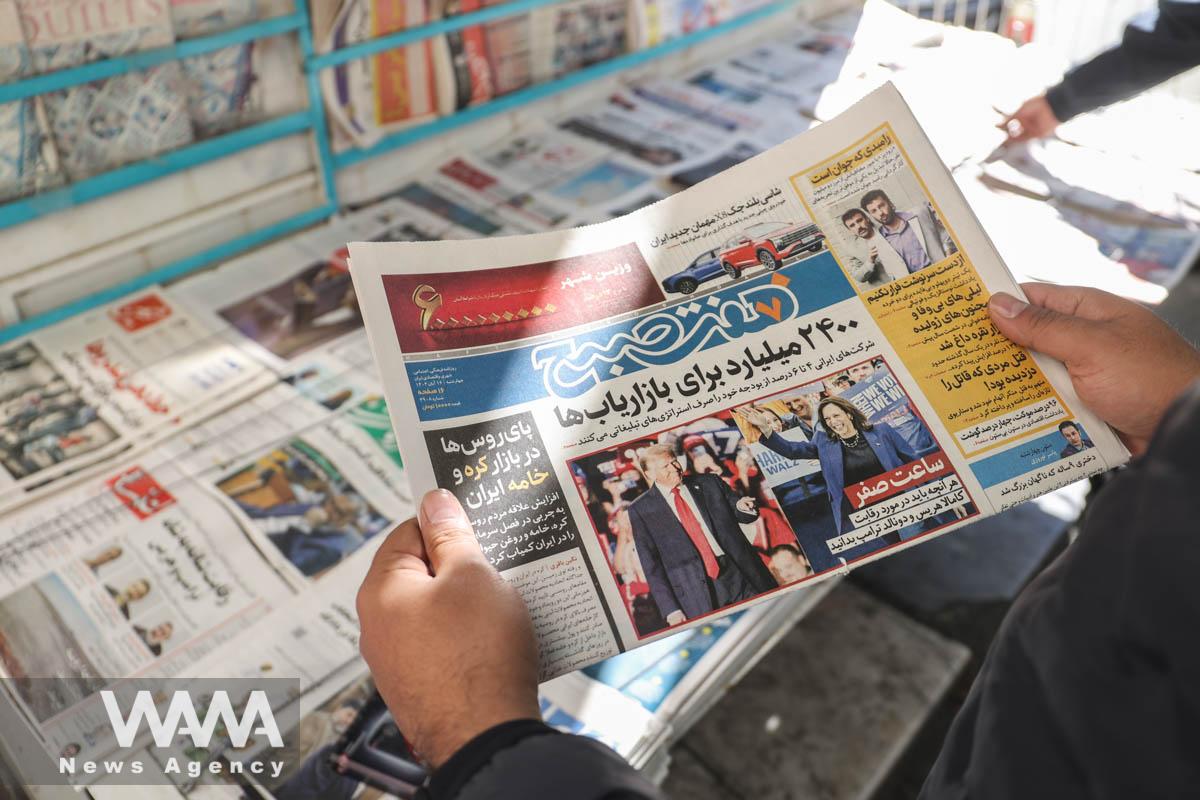Trump’s Return: With More or Less Malevolence?
WANA (Nov 10) – On the third day of his presidency, John Adams, America’s second president and the founder of the White House, wrote to his wife: “May only honest and wise men ever rule under this roof… and may they herald peace and friendship.”
Adams could hardly have imagined that future American presidents would be responsible for some of the most horrific crimes against humanity. The atrocities of Hiroshima and Nagasaki, along with numerous wars and thousands of brutal acts, would stain the legacy of those occupying the White House.
For decades, Americans have had no option but to elect the “worst” candidates for the presidency. The so-called “wisest” presidents, far from serving the people, have often acted as pawns of powerful economic cartels and the Pentagon, with a record marred by war and threats against other nations.

An Iranian man looks at a newspaper with a picture of Republican presidential nominee and former U.S. President Donald Trump and Democratic presidential nominee U.S. Vice President Kamala Harris, in Tehran, Iran November 6, 2024. Majid Asgaripour/WANA (West Asia News Agency)
For years, American politicians have sought to entangle the world in the destructive decisions of Republicans and Democrats, the “elephants” and “donkeys.” Globalizing American-made products has become a hallmark of the U.S., from branding McDonald’s, iPhones, and Boeing to popularizing pop stars, Hollywood actors, and Washington politicians. They believe that spreading American products on a global scale strengthens their soft power. In many cases, this approach has yielded significant benefits for them, enabling greater influence over other nations.
As media influence has expanded globally, promoting the American electoral model has become a priority for Western politicians. Costly, high-profile advertising campaigns, the manipulation of public opinion, uncivilized disputes, accusations devoid of decency, large gatherings with colorfully dressed citizens, and dramatic debates are all used to promote Western democracy as a model.
A key question arises: does this circus-like election model have global appeal? Why should the world’s security and peace be tied to the outcome of each U.S. election? Senior White House officials might do well to understand that other countries are observing U.S. elections to see who, with the least potential for harm and discord, will assume leadership. The global fear surrounding each U.S. presidential election is hardly a point of pride for Washington.

What is Iranian Public Opinion on the U.S. Presidential Election Results?
WANA (Oct 14) – A recent poll conducted by the Iranian polling centre reveals that over 60% of the Iranian population believes there is no significant difference in national interests between a potential presidency of Donald Trump or Kamala Harris. As the U.S. presidential election approaches, various analyses are emerging regarding its potential impact on […]
What kind of election, what kind of governance is it, when even the choice of a president instills fear in other nations? How does this approach justify setting the world on edge? It is a testament to America’s failure that the world now looks at U.S. presidents and wonders: whose malevolence will impact the world less, and whose will bring greater harm?
More than 170 million Americans participated in the November 2024 election, sending Donald Trump back to the White House. Trump is not an untested leader; his past leadership style is well-known. Few American presidents have been as widely criticized, both domestically and internationally. The European Union holds no fond memories of his previous term, nor do the people of West Asia, Africa, or East Asia.
If we look beyond the congratulatory messages from foreign leaders, we sense the anxiety and apprehension underlying their statements. This rush to offer congratulations is more a diplomatic attempt to avoid Trump’s potential wrath than a genuine expression of joy over his victory. Not long ago, Americans ridiculed other nations for electing weak presidents. Today, for at least the past decade, the world has been mocking Americans for their choice of imprudent leaders.

Iranians Dismiss U.S. Election, Calling Candidates Unsavory Figures
WANA ( Nov 05 ) – As the U.S. presidential election approaches, Iranians are reflecting on its potential impact, though many express a sense of skepticism about whether the outcome will bring meaningful change. On Tehran’s streets, anti-U.S. murals and political imagery underscore the ongoing distrust and complex relations between the two nations. Interviews […]
Despite all the accusations from Washington of Iranian interference in U.S. elections, Tehran’s policy has been one of non-intervention, interpreting American allegations as a political ploy for spreading Iranophobia. Aside from the noise created by a handful of Western supporters in Iran, most Iranians no longer care who occupies the White House. Iranians have learned that every American president’s policy has been rooted in enmity toward their country.
Following Trump’s confirmed victory in the U.S. presidential election, opponents of Iran—both moderate and extreme—have begun instilling fear among Iranians on economic, political, and military fronts, aiming to achieve specific objectives.
These groups believe that the “mad Trump” may escalate the hostility with the Islamic Republic, potentially even leading to military confrontation and, ultimately, the toppling of Iran’s government, allowing regime-change advocates to take control.
Such illusions, propagated by Iran’s adversaries, fail to recognize that Iran’s key politicians are not entirely displeased with Trump’s re-election. They are counting on Trump’s missteps and future blunders, viewing him as one of the least competent American presidents in dealing with Tehran.

Pezeshkian’s Reaction to U.S. Election Results: Internal Strength Remains Iran’s Focus
WANA (Nov 07) – In his first remarks following the U.S. election, Iran’s President Masoud Pezeshkian emphasized that the election’s outcome does not impact Iran. “It makes no difference to us who wins in the U.S. election,” he stated, “as our nation relies on its internal strength and the dignity of its people.” The […]












